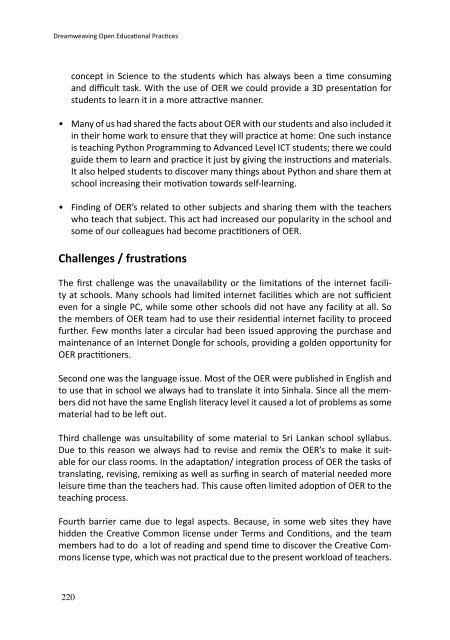Dreamweaving Open Educational Practices
PVvv306Yd9F
PVvv306Yd9F
You also want an ePaper? Increase the reach of your titles
YUMPU automatically turns print PDFs into web optimized ePapers that Google loves.
<strong>Dreamweaving</strong> <strong>Open</strong> <strong>Educational</strong> <strong>Practices</strong><br />
concept in Science to the students which has always been a time consuming<br />
and difficult task. With the use of OER we could provide a 3D presentation for<br />
students to learn it in a more attractive manner.<br />
• Many of us had shared the facts about OER with our students and also included it<br />
in their home work to ensure that they will practice at home: One such instance<br />
is teaching Python Programming to Advanced Level ICT students; there we could<br />
guide them to learn and practice it just by giving the instructions and materials.<br />
It also helped students to discover many things about Python and share them at<br />
school increasing their motivation towards self-learning.<br />
• Finding of OER’s related to other subjects and sharing them with the teachers<br />
who teach that subject. This act had increased our popularity in the school and<br />
some of our colleagues had become practitioners of OER.<br />
Challenges / frustrations<br />
The first challenge was the unavailability or the limitations of the internet facility<br />
at schools. Many schools had limited internet facilities which are not sufficient<br />
even for a single PC, while some other schools did not have any facility at all. So<br />
the members of OER team had to use their residential internet facility to proceed<br />
further. Few months later a circular had been issued approving the purchase and<br />
maintenance of an Internet Dongle for schools, providing a golden opportunity for<br />
OER practitioners.<br />
Second one was the language issue. Most of the OER were published in English and<br />
to use that in school we always had to translate it into Sinhala. Since all the members<br />
did not have the same English literacy level it caused a lot of problems as some<br />
material had to be left out.<br />
Third challenge was unsuitability of some material to Sri Lankan school syllabus.<br />
Due to this reason we always had to revise and remix the OER’s to make it suitable<br />
for our class rooms. In the adaptation/ integration process of OER the tasks of<br />
translating, revising, remixing as well as surfing in search of material needed more<br />
leisure time than the teachers had. This cause often limited adoption of OER to the<br />
teaching process.<br />
Fourth barrier came due to legal aspects. Because, in some web sites they have<br />
hidden the Creative Common license under Terms and Conditions, and the team<br />
members had to do a lot of reading and spend time to discover the Creative Commons<br />
license type, which was not practical due to the present workload of teachers.<br />
220


